Chapter 2
BURLEY
The winter of 1928 and 1929 dumped
deep blankets of snow on the Intermountain West. There was so much
snow that they had to bring most of their belongings up on the train
and leave the car in Clarkston. At the time Ervin and Milton had the
chicken pox so they stayed with Grandmother Buttars. Gover, Aunt
Mary, Gordon, and Ralph, who was just a tiny baby, came up on the
train with ten head of milk cows, their horses, and equipment.
Gover's cousin, John Buttars, brought their household belongings up
on his truck. Since Ervin and
Milton stayed in Clarkston until spring, Gordon was the only one to
help milk the cows and feed the
horses and put them in the barn at night.
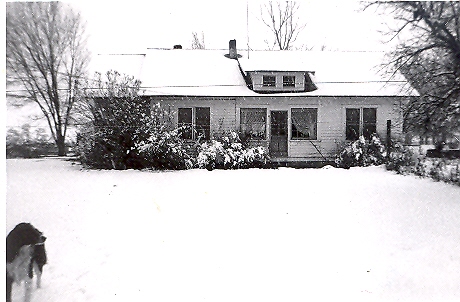
The Buttars home in Burley
Burley
was founded in 1905 when the town site was platted on the south bank
of the Snake River as it bends around the north side of town. In
1904 work had begun on the Minidoka Dam on the Snake river. When the
completed in 1909, it provided irrigation water for more than a
million acres of farm land in Cassia and Minidoka Counties. The
hydro-electric power plant supplied the area with electricity. Burley
was incorporated on July 19, 1909. It was named after by the name of
David E. Burley, an Oregon Short Line Railroad Company passenger
agent. In 1929 the population of Burley was about 3,900, not counting
the outlying rural areas.
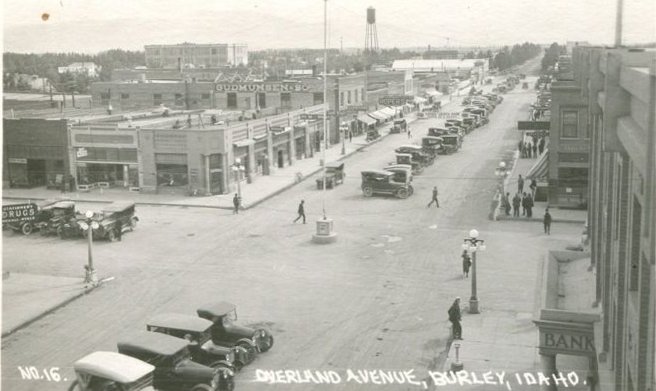
Overland Ave in Burley in the late 1920s
Gordon started school in Burley
during the middle of the fifth grade at the old Miller School. He
rode Old Topps to school in the morning after his chores were
finished. When he got to school, he'd turn Old Topps loose and she
would come home by herself. After school, Gover would usually pick
him up, once in a while he would walk come. Gordon
didn't like school in Burley. It was almost like another world
compared to Clarkston. It seemed like there were more kids in his
class than there were in all of Clarkston.
He hated being around all those city kids, they were a lot different
than he was.
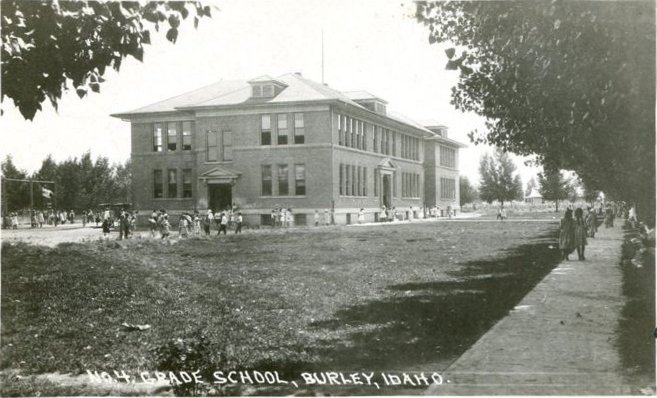
The Miller School in Burley
The change was so drastic, he soon became disinterested in school and in going to church. Several months after moving to Burley, Gordon was ordained a Deacon in the Aaronic Priesthood, although no record exists. Over the next three or four years the entire family, except for Aunt Mary, completely dropped out of activity in the Church.
He was one homesick little boy. All of his friends and cousins, his aunts uncles and his grandmothers were all back in Clarkston. Moving to Burley meant leaving all of his support structure behind. He felt all a lone. Not long after moving to Burley, he wrote a letter back to his fifth grade class in Clarkston. He signed it, "Your lonesome school boy." The teacher read the letter to his former classmates in her tearful, southern accent.
Another thing that made things seem different, the absence of Ervin, Milton, and Swede. Gover told Gordon that they couldn't bring Swede with them. In spring when the snow was gone, Gover rode the train to down Utah to get the car and Ervin and Milton. He was gone a few days longer than it should have taken because he was getting shots for Swede so he could come across the state line. He knew all along he was going to bring Swede to Burley. He was almost as attached to the dog as Gordon was. Not long after moving to Burley, one of the neighbors poisoned Swede for no apparent reason. He wasn't mean or didn't run the neighborhood. Whatever the reason, Swede was dead.
October 29, 1929 was a day that drastically affected every living American for most of the decade of the 30's. "Black Thursday," it was called. The day the stock market crashed, and the beginning of the Great Depression. Money was tight and times were tough. The Buttars ate as good as we do today. They raised a big garden and canned their harvest. They would kill a calf or a lamb and bottle the meat or cured it in salt brine. Money was tight for everyone, but farm families seemed to live through it better. True Gordon wore old clothes with patches, but at least they ate from their own table, rather than from a soup kitchen. And the family had work, unlike so many. Gordon remembered getting a new pair of shoes at J. C. Penny's for $1.25.
On the 15th of January 1931, Orvin Allen was born. Three years later, Gover's seventh and last son, Dean, was born on April 19, 1934. Like his older brother Nolan, Dean never took a breath of this life either. Nolan and Dean are both buried in Clarkston cemetery. Gordon was very close to Ervin and Milton, but Ralph and Orvin were so much younger than him, ten and a half and twelve and a half years respectively.
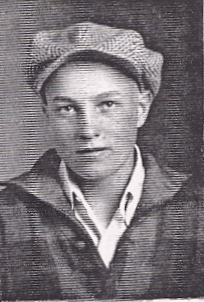
Gordon
Life in Burley was a lot like
Clarkston in one way. They still pulled their pranks, only now Milton
was old enough to help. Gover
had a hired man named Charlie Walker. Once Gover and Aunt Mary went
to Utah, but before leaving, he told Charlie not to let the boys out
of his sight. The first chance they got, they snuck off while Charlie
was out tending the water. Out in the barn they harnessed up a milk
cow with the intention of riding her. By then, Charlie missed them
and went looking for them. Just as he got up to the barn door, Milton
opened it. With Gordon on her back, the cow ran out the door over the
top of Charlie, through the fence, around the yard, and taring up the
flowers and garden. At some point, Gordon was thrown off. They
eventually caught he cow and got her back in the barn.
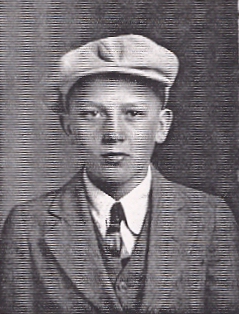
Milton
Another time, Gordon and Milton got two cats and tied their tails together with a piece of string. Milton opened the stanchion and Gordon dropped the cats onto the cows back. Away the cow ran, trying to shake the cats off her back, tearing down the fences as she went. Poor old Charlie spent more time fixing fences than doing anything else. Gover made the boys help Charlie put things back in order. Gover watched them straighten things up with a twinkle in his eye, remembering doing the same things as a kid.
For Gordon, school had become a real drudgery. In the fall of 1934 he started the tenth grade. He was so tired of school, he did not even want to go. Back then school would let out in the early fall for what was called spud vacation, so the kids could help pick potatoes. In those days the potatoes were dug one row at a time. Rather than being loaded directly into a truck, they were dumped on the ground. That is where the kids came in, they followed behind the digger picking them up and putting them into a burlap sack. Once the sack was full, they left it for someone else to pickup and load it onto a wagon or truck. It was a very laborious job to say the least. It was certainly no vacation! But to Gordon, it sure beat going to school.
On the first day of school after spud
vacation, Gordon dreaded going back and his father knew it. As he was
standing by the road waiting for the bus, Gover called him into the
house and told him to get his clothes changed. Gover's
plan to get him to go back to school was to work him so hard that
he'd welcome going back and finishing school. He and Uncle Iraw
(Gover's brother, who moved to Burley a few years earlier) had bought
a band of sheep that fall. They gave Gordon a dog and put him to
herding sheep the rest of the fall. The thing they didn't realize was
that the dog had been trained by a Basque sheepherder.
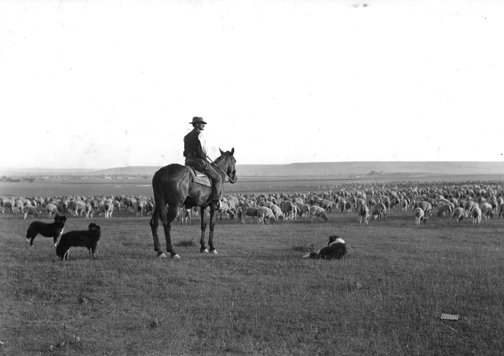
Gordon wasn't very far from the house when he sent the dog out to round up the shep and get them headed down the road. There was a big drain ditch full of water and the dog got the sheep heading right for it. Gordon couldn't call the dog off because he hadn't been trained to understand English. He threw rocks and everything at it, but before he could get it called off, the damage had had been done. Over one hundred head of sheep had drowned.
Gordon went back to the house to tell his dad what had happened. Gover, who was about ready to slit the poor kid's throat. Uncle Iraw was ready to help him. As they looked over the damage, Iraw realized what had happened. He told Gover that it wasn't Gordon's fault. The dog couldn't understand him. After that, Iraw never let a Basquo train a sheepdog. Gordon spent the rest of that fall herding sheep around the area on different farms. After he was through with the sheep, he still didn't want to go back to school. Gover had more work for him to do. That winter he had bought forty head of cows and put Gordon to work feeding them and hauling hay for the cows, and there were spuds to cull as well. He got to where he liked working better than going to school. Needless to say, he never went back.
By not going to school, Gordon didn't know much of what the rest of the kids his age were doing. Besides if he did, he was probably too busy to run around with them anyway. Every Saturday night there was a dance at the Y-Dell. Every once in a while, one of the "Big Bands" like Glenn Miller or Lawrence Welk would come to town. If not dancing, there was the Burley Theater and the movies. Other than that, there wasn't much entertainment for the young people so they had to make their own.
Gordon and Milton had a 1929
Chevrolet Model A they called Old Molly that they ran around in. The
two of them were like best friends and ran around together. They even
double dated together. Gordon
felt bashful and backwards, so he did not go to very many of the
dances. He did, however, take girls out. There used to be a lot of
pretty girls over in Paul. He could only afford a date about once or
twice a month. Fifty cents for gas at nineteen cents a gallon, fifty
cents for the show or a dance ticket, and how much ever the beer
cost.
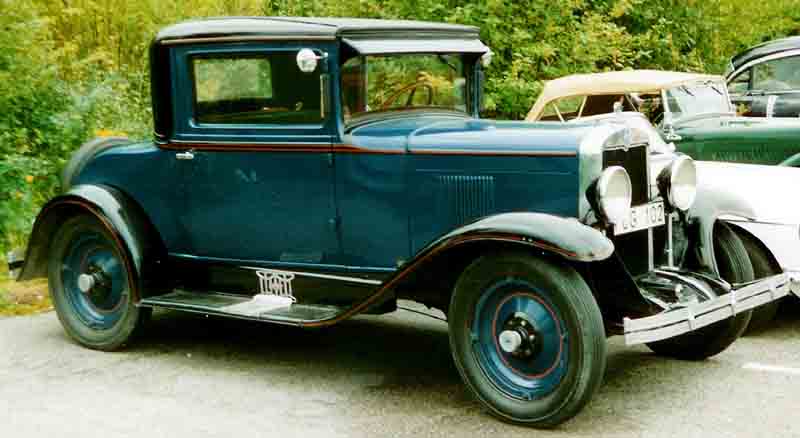
A 1929 Chevrolet Model A Coupe
In the spring of 1935, just before turning seventeen, Gordon wasn't getting along at all with his stepmother. He wasn't very happy at all. He had dropped out of school and quit going to church, although he was ordained a Teacher on March 19, 1935 by James D. Hoggan. The same thought that goes through the minds of many unhappy teenagers went through his too. “Run away from home.” He didn't know where he was going, except running away. Not telling anyone what he was doing, he bought a bus ticket to Pocatello. He didn't like it there so he got back on the bus and went to Blackfoot. That wasn't the place either and he finally ended up in Idaho Falls. Gordon was standing around in a pool hall where a lot of bums hung out. A man by the name of Ben Moore came in asking if anyone wanted a job. Gordon spoke up. Ben asked him how old he was. "Seventeen," was the answer.
Mr. Moore replied, "You don't look it to me." He took Gordon home with him and put him to shoveling spuds. Finding out he knew something about potatoes, Mr. Moore put him to work sorting potatoes. During that first day, Ben found him to be a good worker and took a liking to him. He told his wife, "I'm not taking that kid back to town." Ben took the rest of the help back to town and left Gordon to help his wife milk the cows. They were so impressed with him because he was such a hard worker for a young man seventeen years old, that they hired him and let him stay in their home. He worked for them for about a month.
After that he went to work for Ben's brother–in–law for the rest of the summer. He worked with a man who was an epileptic. One night at supper this man had a seizure in the kitchen door. Gordon was alone with him at the time and it scared him to death. The only way out was through the door and over the top of the poor man. He ran and hid himself out in the barn. By then the man came out or his seizure and staggered out of the house into the yard. Gordon, peeking through the cracks, saw him coming and ran out the back of the barn. He was afraid of him because he thought he was crazy, not understanding the man's condition. Gordon told the boss, "I'm not going to stay around someone like that. He's crazy! I'm going to quit." Rather than loose a good worker like Gordon, Mr. Sleppy (the boss) took the other man back to town.
Gordon wrote a letter to Ervin telling him where he was, and he came to see him. Later, his folks found out where he was and wanted him to come home. Gover was sick and they needed him. So Gordon reluctantly decided to go home.
That fall (1935) after coming home, he met Lola Dayley. She was a couple of years younger than Gordon. He met Lola through her sister, who he had gone to school with. They went together for nearly two years. Milton dated Lola's friend and for about a year and a half the four of them ran around together. In the meantime Ervin married Illa Haden on May 28, 1936.
After going together for a couple
years, Gordon and Lola decided to get married. Part of the reason for
their decision was that they were both tired of living at home. On
September 1, 1937 they were married in American Falls. He was
nineteen and she was about seventeen. They made their home in Burley
and Gordon tried to get started farming.
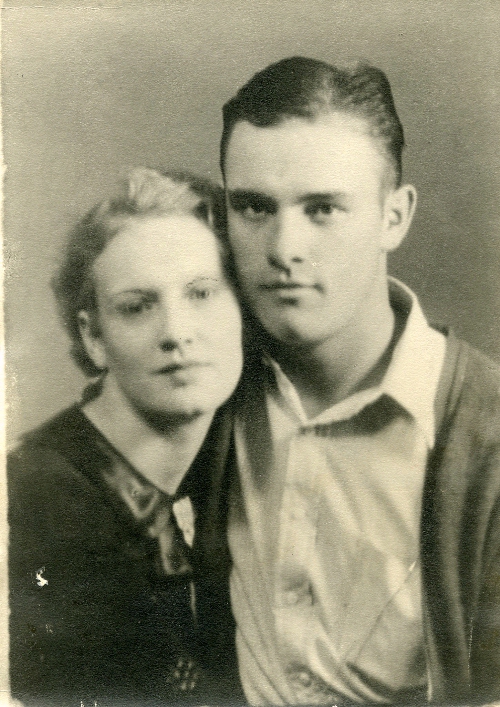
Illa and Ervin
Shortly after their marriage, tragedy struck. One night Ervin and Milton went over to Paul to get Illa. At the time there were no street lights except right in town and North Overland was dark. Where the railroad crossed the highway, there were no signals. As Ervin approached the tracks he couldn't see anything until his head lights illuminated the passing railroad cars By then it was too late. Rather than hitting the train broadside, he turned down the tracks. Regardless of his efforts to get out of the way, he still hit the train. Milton was thrown free, unhurt. But Ervin was caught in the wreckage. His legs were badly mangled, but he was still alive. Due to improper medical care, gangrene set in and two days later Ervin died on February 7, 1938, leaving a wife of less than two years and Lyn, their infant son. Had he lived, Ervin would have been crippled for the rest of his life. They had a funeral for him in Burley as well as one in Clarkston where he was buried near his half brothers and his own mother. Ervin's loss was felt hard by all the family.
In 1938 Gordon tried to start
farming. He had rented eighty acres from Jack Simplot. It was just
across the road and over the canal from his dad's place. Along with
running his place, he helped his dad. However Gover wasn't much help
to him in getting started. That fall after he got his crops
harvested, his farming came to an end. He wasn't able to keep going
on his own without any help from his dad.

Joyce?
About that time Lola had a baby girl on September the 18, 1938. They named her Joyce Thelma. The happiness of the event was marred by the fact that he lost the farm. Having no other choice Gordon went to work for his father and different neighbors. He walked to and from work and earned a dollar a day.
To make natters even worse, he and
Lola weren't getting along. They were to young to start with, and
their financial bind contributed to the conflict as well. After a
while they were separated in 1940 and Gordon went back to Idaho
Falls to find work. Not finding any, he came back to Burley. After
being separated for about a year, Gordon and Lola were divorced in
July of 1941. Lola soon
remarried and left town. Gordon didn't see his daughter again until
several years later. 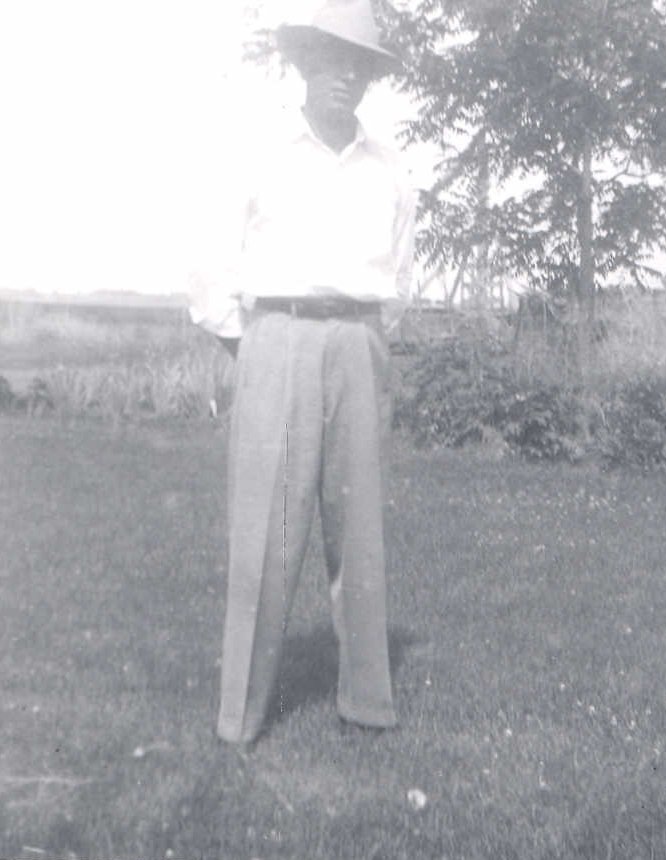
Gordon in 1941
Milton had gone back to Clarkston where he married Annabelle Loosle on January 21, 1941, Before they had been married a year, Annabelle died in childbirth. The baby died too.
When their divorce was final. Gordon was tired of the troubles and problems, and finding work was hard. The draft had started up due to the mounting world situation with the war in Europe and mounting tensions with Japan. He had heard army stories of World War I and knew that wasn't for him. Rather than being drafted, he enlisted in the United States Navy on September 18, 1941, Joyce's third birthday.